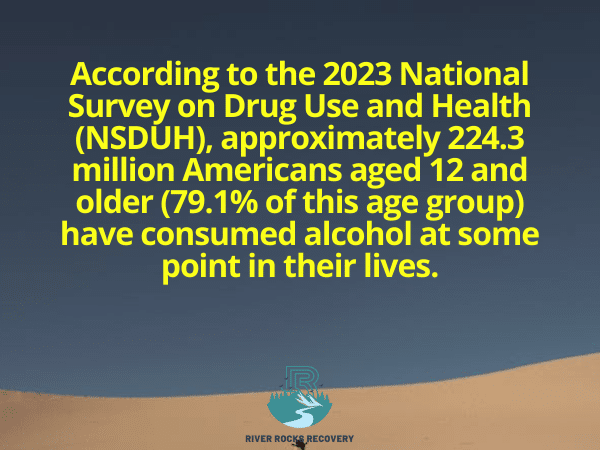Alcohol breath is a common yet often embarrassing issue that arises after consuming alcohol. Unlike bad breath caused by food particles or poor oral hygiene, alcohol breath comes from inside the body, making it harder to eliminate. Whether it’s the short-term effects of drinking or the chronic alcohol breath associated with long-term alcohol use, understanding why it happens is essential.
For individuals struggling with alcohol addiction, persistent alcohol breath can be a sign of excessive drinking, underlying health concerns, and even serious medical conditions like liver disease. At River Rocks Recovery, we help individuals struggling with alcohol dependency through comprehensive addiction treatment programs, including:
- Alcohol Rehab Treatment
- Addiction Treatment Program
- Partial Hospitalization Program (PHP)
- Intensive Outpatient Program (IOP)
- Outpatient Program (OP)
If alcohol consumption has become difficult to control, recognizing the signs of alcohol dependence is critical. In this article, we’ll explore:
- What causes alcohol breath?
- How alcohol is metabolized and why breath smells of alcohol
- Why alcohol breath can persist even after drinking stops
- Health risks associated with chronic alcohol breath
- How to reduce or eliminate alcohol breath
- How addiction treatment can help individuals struggling with alcohol dependency
What Causes Alcohol Breath?
Alcohol breath occurs when alcohol is metabolized by the body and expelled through the lungs and digestive system. Unlike food odors, which primarily linger in the mouth, alcohol breath originates from within the body and can persist for hours.
1. Alcohol Metabolism and the Role of the Liver
When you drink alcohol, it enters the bloodstream and is primarily metabolized by the liver. The liver processes about 90% of the alcohol, but the remaining 10% is expelled through breath, sweat, and urine.
- When alcohol is metabolized, it produces acetaldehyde, a toxic byproduct that contributes to alcohol breath.
- Some of this acetaldehyde is released through the lungs, which is why breathalyzers can detect alcohol content in the breath.
2. Alcohol Absorption in the Digestive System
Alcohol is absorbed through the stomach lining and small intestine, meaning that even after drinking stops, alcohol continues to circulate in the blood. This keeps alcohol breath present for hours, and in heavy drinkers, it can last all day.
3. Dehydration and Dry Mouth
Alcohol dehydrates the body, reducing saliva production, which normally helps wash away bacteria and odors. This dry mouth effect makes alcohol breath more pronounced and long-lasting.
4. Residual Alcohol in the Mouth
Even after swallowing, traces of alcohol remain in the soft tissues of the mouth, tongue, and gums. This residual alcohol continues to emit a strong odor, making it difficult to mask.
Why Does Alcohol Breath Linger?
Even after drinking stops, alcohol breath can persist for several reasons:
1. The Body Needs Time to Fully Metabolize Alcohol
- The liver can only process alcohol at a fixed rate—about one standard drink per hour.
- If large amounts of alcohol were consumed, the body can take several hours to fully eliminate alcohol, prolonging the odor.
2. Chronic Alcohol Use Leads to Prolonged Alcohol Breath
Individuals who drink frequently or heavily may experience persistent alcohol breath, even when they are not actively drinking.
- This occurs due to long-term alcohol buildup in the body.
- Heavy drinking can also lead to liver damage, slowing down alcohol metabolism and extending the duration of alcohol breath.
3. Alcohol-Induced Gastrointestinal Issues
Chronic alcohol use can irritate the stomach lining and lead to acid reflux, a condition known as gastroesophageal reflux disease (GERD).
- GERD causes stomach acid and alcohol vapors to be released into the throat and mouth, leading to prolonged alcohol breath.
4. Acetaldehyde Accumulation
- Some individuals process alcohol more slowly due to genetics, leading to higher levels of acetaldehyde in their system.
- Acetaldehyde is a toxic compound that contributes to nausea, hangovers, and alcohol breath.
Health Risks Associated with Chronic Alcohol Breath
While temporary alcohol breath after drinking is common, persistent alcohol breath can indicate underlying health issues.
1. Chronic Alcohol Use and Liver Disease
- Long-term alcohol consumption can lead to liver disease, fatty liver, or cirrhosis, impairing the body’s ability to process alcohol efficiently.
- Individuals with liver damage often have a persistent musty or sweet smell on their breath, known as fetor hepaticus.
2. Increased Risk of Alcohol Dependence
- Frequent alcohol breath can be a warning sign of problematic drinking habits or alcohol use disorder (AUD).
- Individuals who struggle to control their drinking may benefit from addiction treatment programs.
3. Social and Professional Consequences
- Alcohol breath can negatively impact personal and professional relationships.
- Individuals who frequently smell of alcohol may face job loss, legal trouble, or relationship strain.
If alcohol breath is a persistent issue, it may indicate a serious drinking problem. Seeking professional addiction treatment can address the root cause.

How to Get Rid of Alcohol Breath
While brushing teeth and using mouthwash can temporarily mask alcohol breath, eliminating it requires allowing the body to fully metabolize alcohol.
1. Hydrate and Restore Electrolytes
- Drinking plenty of water helps flush alcohol from the system.
- Electrolyte-rich beverages like sports drinks, coconut water, or broths help restore balance.
2. Eat Nutritious Foods
- Eating protein-rich and fiber-rich foods can slow alcohol absorption and reduce odors.
- Foods like lean meats, eggs, fruits, and whole grains support liver function and digestion.
3. Stimulate Saliva Production
- Chewing sugar-free gum or mints increases saliva flow, helping to clear alcohol residue from the mouth.
4. Allow Time for Alcohol to Leave the Body
- The only true way to eliminate alcohol breath is to let the liver process alcohol naturally.
5. Address the Root Cause
If alcohol breath is frequent or persistent, it may indicate alcohol dependency. Seeking professional addiction treatment is the best step toward long-term recovery and improved health.
How River Rocks Recovery Can Help
At River Rocks Recovery, we specialize in alcohol addiction treatment programs designed to help individuals regain control of their lives.
Our Treatment Programs Include:
- Partial Hospitalization Program (PHP) – Intensive, structured treatment for alcohol use disorder
- Intensive Outpatient Program (IOP) – Therapy, relapse prevention, and life skills training.
- Outpatient Program (OP) – Continued support for maintaining long-term sobriety.
- Addiction Treatment Program – Evidence-based approaches for recovery and relapse prevention.
At River Rocks Recovery, we provide personalized treatment programs to help individuals overcome alcohol dependence and reclaim their health and well-being. Through structured therapy, medical support, and holistic recovery strategies, we help individuals break free from alcohol addiction and regain control of their lives.
Conclusion
Alcohol breath is more than just an unpleasant side effect of drinking—it can be a warning sign of excessive alcohol consumption and underlying health issues. While occasional drinking can result in temporary alcohol breath, persistent or frequent alcohol breath may indicate alcohol dependency, liver dysfunction, or other serious medical concerns.
For those who struggle with frequent alcohol breath due to heavy drinking, it may be time to evaluate their relationship with alcohol. If drinking has become difficult to control, leading to health issues, relationship problems, or workplace consequences, seeking professional addiction treatment is the best course of action.
Call River Rocks Recovery at 888.905.6281 today to start your recovery journey. Recovery is about more than just quitting alcohol—it’s about rebuilding a healthy, fulfilling life. Let us help you take that next step!
FAQ About Alcohol Breath
Why does alcohol cause bad breath?
Alcohol breath occurs because alcohol is metabolized by the liver, and some of it is expelled through the lungs, sweat, and urine. Additionally, alcohol dries out the mouth, reducing saliva and allowing odor-causing bacteria to thrive.
How long does alcohol breath last?
Alcohol breath can last several hours, depending on:
- The amount of alcohol consumed
- The individual’s metabolism rate
- Whether the person is hydrated and has eaten food
For heavy drinkers, alcohol breath may persist even after drinking stops due to prolonged alcohol metabolism.
Can brushing your teeth remove alcohol breath?
Brushing your teeth and using mouthwash can temporarily mask alcohol breath, but they do not eliminate the odor completely. Since alcohol is expelled through the lungs and digestive system, it must be fully metabolized to disappear entirely.
What are the best ways to get rid of alcohol breath?
- Drink plenty of water to help flush alcohol from the system.
- Eat high-protein foods to slow alcohol absorption.
- Chew sugar-free gum or mints to stimulate saliva production.
- Get fresh air and engage in light physical activity to support metabolism.
Why do some people have persistent alcohol breath, even when not drinking?
Frequent alcohol breath may indicate:
- Chronic alcohol use or dependency
- Liver disease or poor liver function
- Gastroesophageal reflux disease (GERD), which allows alcohol vapors to rise from the stomach
If alcohol breath is persistent, it may be a sign of alcohol dependence and should not be ignored.
Can alcohol breath indicate a drinking problem?
Yes. If alcohol breath is a recurring issue, it may suggest:
- Heavy or frequent drinking
- An inability to control alcohol consumption
- Early signs of alcohol use disorder (AUD)
If you or a loved one is struggling with alcohol dependence, professional help is available.




























